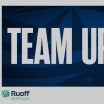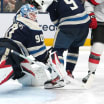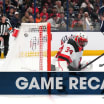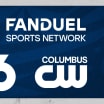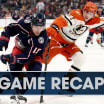The hours are being counted down, with Monday's 3 p.m. NHL Trade Deadline fast approaching.
Several big trades have already been made, but none involved the Blue Jackets. That doesn't mean they're not intently assessing the trade market, looking for ways to improve the roster, and it doesn't mean they haven't tried to get into some of those deals.
As Blue Jackets general manager Jarmo Kekalainen has learned in five years at the helm, it takes two sides to make a trade happen - and even when you pull one off, that you're sure will work, sometimes it just doesn't.
"We did one big deal at the deadline and probably learned a lot from that too," Kekalainen said Saturday, sitting in his office prior to the Blue Jackets' 3-2 victory against the Chicago Blackhawks. "We got a player who we felt was going to be an impactful guy for us, because we were trying to make the playoffs that year and fell one point short. He didn't do that well for us, and then we traded him the next year to Los Angeles."
Trade Deadline Q&A: Playoffs are the goal, but 'not at any cost'
Blue Jackets GM Jarmo Kekalainen assessing trade market, keeping present and future in mind
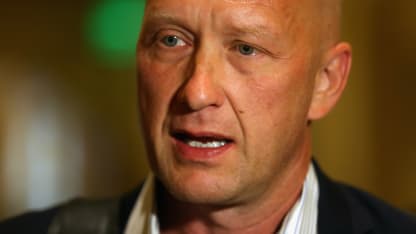
© Bruce Bennett/Getty Images
That guy was right wing Marian Gaborik, whom the Blue Jackets acquired from the New York Rangers in 2013 for a package that included center Derick Brassard, defenseman John Moore and gritty forward Derek Dorsett.
Gaborik had eight points (three goals, five assists) in 12 games after the trade that season, which was shortened to 48 games by a lockout. Columbus fell a point shy of qualifying for the Stanley Cup Playoffs, in Kekalainen's first season on the job, and Gaborik then had 14 points (six goals, eight assists) in 22 games the following season - which included a lengthy injury absence.
So, the Blue Jackets traded him to the Los Angeles Kings and watched Gaborik play a critical role in winning the 2014 Stanley Cup - finishing the postseason with 22 points (14 goals, eight assists) in 26 games.
Lesson learned.
"Wasn't doing well for us, and then he went and scored 14 goals in the playoffs for Los Angeles," said Kekalainen, who sat down with BlueJackets.com on Saturday to discuss the Blue Jackets' outlook this season at the deadline. "We gave up some good players and prospects to make that trade, and Gaborik was a good player, but it just didn't work for us. And then he goes to Los Angeles and works out great for them in a year when they win the Cup. So, were we right with Gaborik? I guess not, because he didn't work for us … but he was a good player. So, in a way, we were right. He just didn't fit."
Keep that in mind if the Blue Jackets decide not to make a major trade prior to the deadline passing this season. Kekalainen has since showed he's not afraid to strike deals for star players, but he also learned a lesson about his job back when he was just a couple months into it.
"That's a good example of sometimes you might get a good player, a great goal-scorer, but he doesn't really help you, even though you thought it would," Kekalainen said. "He just doesn't fit. Those things are really hard to figure out, and that's what we do for a living, so we want to be right more than we're wrong and analyze right when we make that decision. That one didn't work for us, but at the end of the day it did. We got some picks for him and moved along."
They also added some deadline experience, which will surely be among the factors considered by the Blue Jackets with the clock winding down.
As the deadline approaches, here's what Kekalainen had to say less than 48 hours out:
Last year, you guys had a playoff spot basically wrapped up at this point. This year, you're on the bubble. How is it different for you this year at the deadline than a year ago?
"Well, it makes things more difficult, obviously. Last year, we could start planning at the deadline what we needed to add to our team to be more successful in the playoffs, knowing that we're most likely going to be there. Now, you have to think about getting there … but not at any cost, because we want to be good next year, the year after, and the year after that and so forth.
"To be good in those future years, you need to have your depth chart stocked with prospects and draft picks. And to give away all those to just make sure or try to do whatever it takes this year to make the playoffs, and mortgage our future for doing it, is too much of a price. So, that's where the biggest difference is.
"We all want to make the playoffs. We really want to make the playoffs, and it's our goal. It's been our goal and will be our goal until the end, but not at any cost, if it comes at a cost where we all of a sudden have to steer away from what our long-term goal is. That's not worth the price."
How difficult is that line to walk, though, especially with such a young team? It would be a pretty big deal around here to make the playoffs back-to-back years, wouldn't it?
"Yeah, absolutely. The guys are battling, and we'd like to help the team, we'd like to make the playoffs two years in a row. There's no question about it. But I think the one thing, too, is that I really do think our team, downstairs there, is full of guys in the room who can make the playoffs. I think the biggest difference from the time that we have played well to the times when we have struggled is just the performance of our team. It can be a very good team to a team that's not performed as well and is sort of on the borderline of being a playoff team.
"I think we just need to play better. I think we have the guys to do that. We have the personnel to play better. We've shown that through many stretches this year, that we have a good enough team with good enough players to make the playoffs if we just play the way we can. So, I don't think that adding a player or two is going to be that drastic of a difference. You know, you can talk about a little shakeup, you can talk about making changes just to shake up the group, but you know what? There's nothing wrong with the chemistry of our team.
"The guys like each other, they've gone through great times with each other, they've gone through a 108-point season last year, 16-game winning streak and they've struggled together this year. So, they've gone through it all and we have good chemistry in the room. I'm sure adding something to certain areas of our game would probably be positive, but it doesn't always work that way either.
"There's several examples around the league, where you think, 'Oh, that trade, that's going to make the team better,' when actually it does the opposite. So, I think it has to be something where we see that, 'OK, it's help for now, help for the future, this is a piece that we want for our team long-term,' and if that's available, at the right place, we'll be willing to make those changes to make our team better. We've shown that several times, but to make a trade just to make a trade, that's never been something that we want to do. I still think the solutions and the answers are in the room and we've just got to play better."
Have the recent trades that have already been announced, particularly the one with Derick Brassard going from Ottawa to Pittsburgh, affected the outlook at the deadline at all?
"No, not really. We talk with the general managers [of other teams] all the time, and that's not just at the deadline. We talk every week or every two weeks. So, we talk regularly about certain players that might be available, might not be available. We know the lay of the land. We know the prices. We know what it would take, so when we actually get closer there might be a little bit more of a push if there's competition for the same players, and then … you either stay in the race or you drop out if you think the price is too high.
"Or, in some cases, no matter what you try to do you can't get into the race. We can't make a deal by ourselves. Sometimes you just might not have the piece they want, and no matter what you do, you just can't get in it. There's several examples of conversations that, unfortunately, I can't give any details about, but no matter what you do, you just can't get in there because you don't have the piece. They like something else better and that's it. You want to get in it, but you can't, no matter what you do."
Have you ever seen prices go down as the deadline approaches, if teams need to unload some guys for whatever reasons?
"Well, I mean, 'unload' is usually guys they don't see as part of their puzzle moving forward, and if they need cap space, that's the 'unload,' and those are usually the situations that you don't want to get into either. I think the [Artemi] Panarin trade was an example for us of a team that has cap troubles and needed to move a player that they would've probably had to move in a couple years anyway. So, we were able to get into that because of the situation. But in the cap world, those problems are real.
"We'd have all kinds of room to get into any kind of discussion right now with our cap, so it's not an issue of cap room. But there's also real dollars involved here, so this is not just a 'Monopoly' game where you just deal with the cap numbers in 'Monopoly' money. There's also a real budget of cash and real money that you have to deal with, and it's real, instead of just playing with cap dollars."
Trades can be messages to the locker room, right? If you add a guy it'd be a message like, 'Hey, we're going for it,' …
"… and it can also say, if you don't add a guy, that we trust in the guys and have full faith in the guys who are in the room already. You can see it in a lot of different ways. I'm sure that the guys feel that, 'OK, there's a good player who can help us,' and he comes into the room, most of the players will feel like, 'OK, this is great for the room.' But he's going to take somebody's job too. So, there is always two sides to the coin and to every equation. So, it's not just as simple as saying, 'OK, everybody's going to be happy,' when you add a guy … or when you trade somebody out of your room, with another piece, and somebody loses a friend in a trade. There's always a human side and a chemistry side to every trade that is unpredictable."
Along those lines, there's a lot of talk about the Jack Johnson situation recently … are you negotiating with him, will he be traded? What can you share about that situation?
"The only thing to say is that you are always covering all the bases with all the UFAs [unrestricted free agents]. Let's say that if we decided to continue together, the journey together, what it would be … and if we can't come to an agreement, what should we do then? Should we keep the guy? Should we move the guy? Those are the options that every team in these situations are usually looking at. Those are the options: Keep the guy or let him walk? Trade the guy or get something in return? Sign the guy and keep the guy. Those are the three options, and you're always covering your bases to know what each option would look like.
"It's just normal business that we do every day with any pending UFA there might be, now or in the future, and that starts July 1 in the last year of their contract. That's when you start finding out that, 'OK, well, we're going into the last year of the contract, if we wanted to extend you, what would it be? OK, well, let's wait and see.' Then you talk about it again, maybe in September. We talk about it again in December, and then we talk about it again in January, February and March. And then, if you decide, 'Well, OK, we can't come to an agreement,' should we rent him to ourselves and let him walk or should we move him and get something for him? Those are the options. Everybody goes through those all the time. It's standard procedure, just covering all your bases. Nothing else."
Monday there's a deadline coming up, so we'll find out then whether Jack's still here for the rest of this season or not. Is the deadline sort of a closing window for coming to an agreement with him or would you still keep talking afterward?
"If he stays here, he could still go walk July 1 or figure out a way to stay here. Then, it's down to two options after the deadline, if he stays here. Until then, it's three options."
It doesn't seem to be affecting his play, especially the past few weeks …
"He gets paid a big salary here and he's expected to handle it like a professional, which he has."
You've been quoted about valuing your first-round pick this year. Is that more about the depth and talent at the top of this year's draft or the fact you just don't want to have back-to-back years without a first-round pick?
"It's the two years in a row not having a first-round pick. Last year, not having a first-round pick created a big hole in our depth chart. And to happen two years in a row would just double the size of the hole in our depth chart. So, that's the biggest reason."
So, as we sit here now, if you feel there is no deal out there that helps this team, then you're fine standing pat at the deadline with the guys you have already?
"Yeah, or maybe there's something small or whatever. But we're only making deals to make our team better. We're not making deals to satisfy somebody who thinks that we should make a deal or is anxious for us to make a deal. We understand and respect the concern of any of the people that care about the Blue Jackets, but we are here to make the right decisions that are going to help the club now and into the future. That's how we have to operate. We have to make smart decisions for the future of the Blue Jackets and that's the only criteria that we're going to look at."



